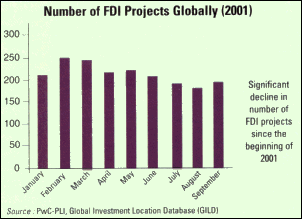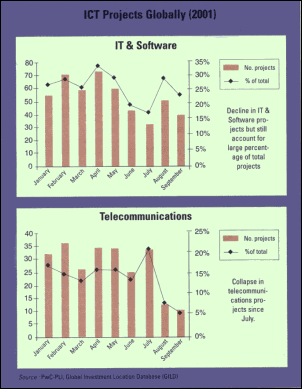T |

he American dream came to Europe and created its teenage information technology (IT) millionaires. Up went property prices, property availability and the cost of hiring. Europe had its very own IT hot spots. Next came dot.com gloom: tech stock exchanges were on their knees, and the hot spots turned warm. But silver linings are ever present: An IT company seeking expansion in Europe could be in for a pleasant surprise.
Any North American company dismissing the doom and gloom of economic warnings and pursuing real estate deals in Europe could turn up a bargain. We’re not looking at the level of bargains to be found in post Gulf War Europe yet, but the availability of real estate for IT companies around Europe is markedly less tight.
London — one of the most expensive European real estate markets — is showing rapidly declining occupier confidence, according to a Royal Institution of Chartered Surveyors’ survey. The survey shows that 73 percent more chartered surveyors are reporting a fall in office demand than a rise, partly as a result of the weakness in the IT and telecoms sectors; there is more decline to come. This could set a trend around Europe, especially since, according to Chris Pieroni, head of international at Colliers CRE: “It’s quite common for corporates coming to Europe to establish a presence in London first. If that starts to work, they will look to expand into other parts of Europe.” Coming out of London and heading west is the M4 corridor; the adopted home of the UK IT industry. Take-up levels in this part of the UK are significantly down, according to press reports.
IT Crash Opens Space
 Jeremy Kelly, associate director of European research at Jones Lang LaSalle comments: “By the end of 2000, the IT sector accounted for nearly one-third of office space take-up across Europe. This year, that’s fallen off quite significantly. At the same time, we’re seeing an increase in supply in a number of markets, so tenant choice is increasing.” Stockholm is a case in point: There has been a 17 percent decline in prime office rents, partly as a result of the downturn in the IT sector.
Jeremy Kelly, associate director of European research at Jones Lang LaSalle comments: “By the end of 2000, the IT sector accounted for nearly one-third of office space take-up across Europe. This year, that’s fallen off quite significantly. At the same time, we’re seeing an increase in supply in a number of markets, so tenant choice is increasing.” Stockholm is a case in point: There has been a 17 percent decline in prime office rents, partly as a result of the downturn in the IT sector.
Steve Dunevein, associate director at Colliers CRE, says that a North American company coming to Europe would find a distinctly different market now compared with the situation a year ago, although any remaining activity has stayed in the same locations: London, Amsterdam, Paris and Frankfurt. “A lot of opportunity exists in those four cities,” says John Duckworth, associate director of the Corporate Solution Team at Jones Lang LaSalle. “If you go back to second division — such as Lyons, Berlin, Manchester, Barcelona, Madrid and Milan — they had a lot of activity last year,” but he says these locations are particularly challenged on the IT real estate front this year.
“In June 2000 they would find it very difficult to find anything,” says Dunevein, indicating that a year ago IT companies were competing with rivals for real estate that may have cost over the odds and signing leases that contained clauses clearly weighted in the landlords’ interests. “All those locations will remain, but there is slightly less competition to go there. Your hot spot becomes warm, but the criteria that made it hot are still there,” says Dunevein.
“There’s been a surge in supply of — let’s call them distressed assets — in the last nine months in the market,” says Duckworth at Jones Lang LaSalle, referring to the co-location section of the IT industry. “If an American company that has that kind of requirement were to come over here, it should look at that market.”
Sieb Hoogstra, manager at PricewaterhouseCoopers-Plant Location International (PwC-PLI) in Brussels, the location advisory practice for PwC Global, comments that boom-time confidence has triggered some building on risk, despite European property developers having had their fingers burned in the last recession. “We’re not seeing whole business parks built on risk in the gung-ho mode of the late 1980s, just the odd phase of development that could now remain unlet and therefore create availability,” he says. He adds that sub-letting is also creating space availability — now that European IT and telecom company downsizing is commonplace.
Hoogstra says terms are shifting: “Companies tend to lease, they tend to have shorter and very flexible terms.” He continued that there is now more margin in negotiation, with the corporate holding more sway over lease terms, get-out clauses and sub-letting options. Incentives and capital contributions towards fit-outs are also showing up once more in Europe.
Hand-in-hand with the cheaper, more available real estate market is increased fluidity in the European IT labor market. Wim Douw, senior consultant with PwC – PLI, says: “Now we have some signs from the Dublin market that the labor market has decreased over the last couple of months — which is a very good indicator showing that the tightness of the labor market is also decreasing. Probably this is directly related to the start of this economic recession we are currently witnessing, where companies start downsizing and reorganizing.” Hoogstra adds: “On the other hand, in terms of labor availability, you still see a tightness for the special skills. We still have clients who say that it is hard to hire the more specialised IT skills in the hot spots.”
Douw says: “There was a tremendous shortage of labor in the IT sector. When we say that the tightness has decreased, it doesn’t mean that companies don’t have problems finding IT skills. Generally speaking, the demand for IT skills is still larger than the supply, although maybe it has become more balanced over the last six months.” In the UK, statistics show that labor-market pressures are hardly easing at all.
Current Events Further Slow IT Pace
On top of the downward economic trend is the effect of the terrorist attack of Sept. 11.
According to PwC-PLI’s Global Investment Location Database (GILD), the most recent information shows quite a decrease in project announcements after the attack, says Douw (see charts). “There was already a negative trend in IT and telecom project announcements,” said Douw, but added that companies may have put their project announcements on hold for a couple of weeks because of the threat of terrorism. “Business goes on and companies continue to invest in their plans. If their plans are based on economic reasons, they will continue to form their expansion strategy,” Douw explains.
While PwC-PLI has not seen any of its own clients’ projects cancelled, there has been some shift in the location decision criteria, which now puts more emphasis on security considerations for new EMEA operations. Dunevein at Colliers CRE says: “The economics and infrastructure generally lead the deal. Security is always in their mind anyway.”
So, there could be some good real estate deals around Europe for North American IT companies. According to Pieroni at Colliers: “At the moment, quite ironically, it’s probably quite a good time for American corporates to move into London.” But Hoogstra had a word of warning: “We still see the necessity for many IT companies to consolidate and reduce costs. I think now it’s very important for these companies to investigate these markets very well, not just the real estate but also the labor market as well as other drivers for the project.”

